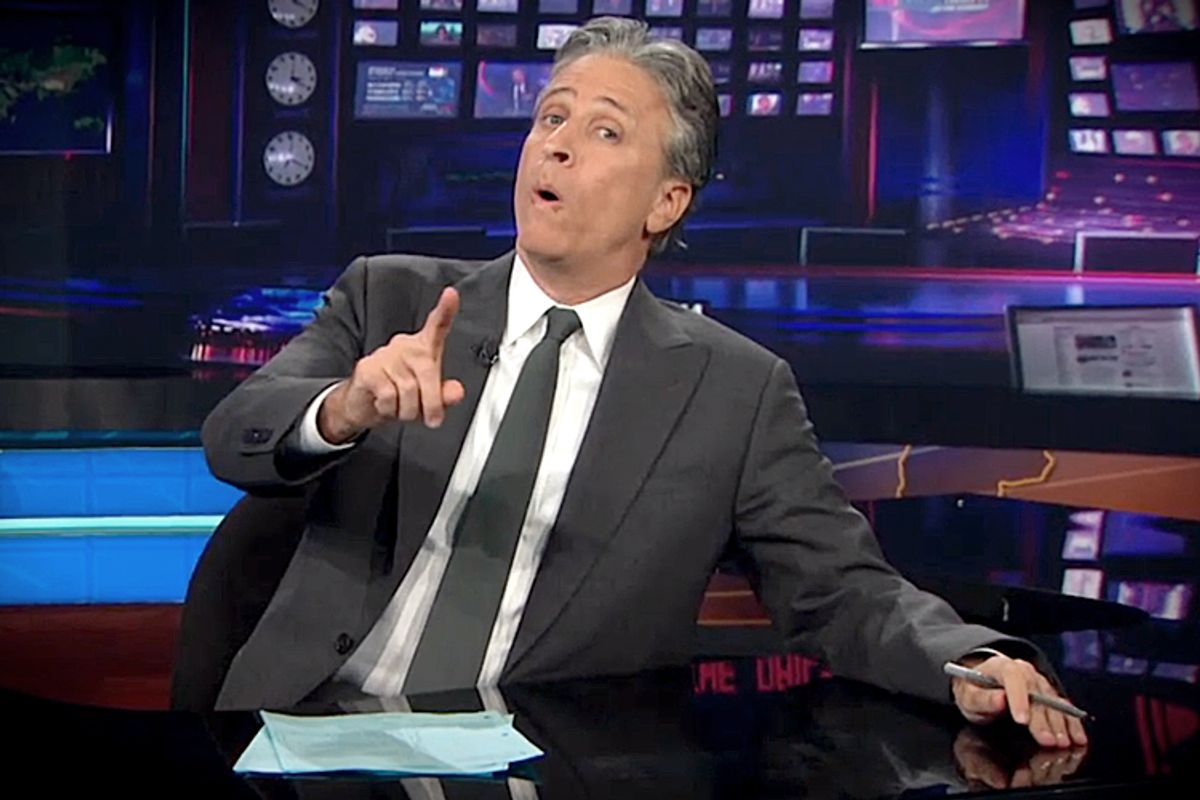Jon Stewart is known among his fans for speaking truth to power -- see his dismantling of the CNN show “Crossfire,” for instance, or his criticism of President George W. Bush and the “Mess O’Potamia” in Iraq on “The Daily Show.” However, his recent work may have turned some liberals against him.
Stewart defended present-day cinema punching bag “Zero Dark Thirty” as having not been made in cooperation with the government and said the torture it depicts is “difficult,” raising the ire of liberals across the blogosphere. (Andrew Sullivan wrote that “this subject is too important for equivocation or the ‘I'm just a comedian’ cop-out.”)
Then came Stewart's smug dismissal of the “trillion-dollar coin” idea floated in order to stop the debate debacle in Congress. While the idea was not tenable for many reasons (including optics), Stewart’s open mockery and suggestion of alternatives got him in hot water with Paul Krugman, the Nobel-winning economist and New York Times columnist.
“Stewart seems weirdly unaware that there’s more to fiscal policy than balancing the budget,” wrote Krugman. “But in this case, he also seems unaware that the president can’t just decide unilaterally to spend 40 percent less.”
Jonathan Chait at New York magazine wrote that the Comedy Central host “flunks econ” and is operating under a premise about economics that was “completely uninformed.” Chait told Salon that he generally agrees with Stewart’s arguments but that the host’s “homespun Hooverism” tends to “dovetail a little bit with elite moderate liberal sentiment. Keynesian economics is not intuitive.”
The root of that so-called Hooverism ("Hoover" as in Herbert, the failed president who presided over the 1929 stock market crash) may stem from an enlightened desire to weigh both sides of every argument equally. “One of the habits he has,” said Chait, a fan of Stewart’s, “is to want to be bipartisan and value that -- but sometimes he misunderstands the way he needs to do that. Basically, you'll have Republicans in Congress do something objectionable, and the Democrats won’t agree to it. Then he’ll blame it on ‘Congress.’ It’s not fair to criticize both parties in Congress when one side is doing something objectionable.”
Leslie Savan, a blogger for The Nation, has long taken issue with Stewart’s equivalency between two sides, citing the 2010 Rally to Restore Sanity and/or Fear, which equally criticized activists on the far right (including birthers) and the far left (including groups like CODEPINK, who called George W. Bush a war criminal). “He’s so stuck on tone,” said Savan. “If somebody looks silly, it’s like waving a cape before his comic bull. And, in a way, that came out in this thing with the coin -- ‘what a silly, crazy, nutty idea.’ But it was sane compared to what could happen if the House Republicans don’t raise the debt ceiling.”
Stewart has consistently exculpated himself from serious scrutiny by declaring that he’s simply a comedian, but both Chait and Savan declared that he’s more powerful than he lets on, or perhaps knows. “He's influential in how people process information," said Chait, and he deserves to be influential.”
Savan stated that Stewart is able to turn his viewers against loopy-seeming but perhaps useful arguments simply with a baleful look or silly accent, cuing the audience to laugh. “If he attaches that mugging look, they start laughing, no matter who the target is. He’s cruel and he doesn’t even know it. He's a bully! ... I think he wants to deny [that he’s anything more than a comedian] so he can maintain that perch of seeing everyone else as being goofy.”
Not every one of his targets, though, is quite so unhappy with their coverage. Ed Needham, a member of Occupy Wall Street’s press relations working group, told Salon that the group hadn’t minded “The Daily Show's" attempt to paint them as a self-satisfied mix of “moochers” and “Ivy League assholes.”
“We're certainly worthy of criticism from time to time. There’s gonna be disagreements. There's certainly no animosity. I think he's someone who speaks truth to power.”
Indeed, Stewart will always have his fan base, and it's not just made up of liberals. After opening the floor to commenters who took a less dim view of Stewart's remarks on "Zero Dark Thirty," Andrew Sullivan emailed Salon: “I don't consider myself a liberal critic of Stewart; I consider myself a conservative admirer."



Shares